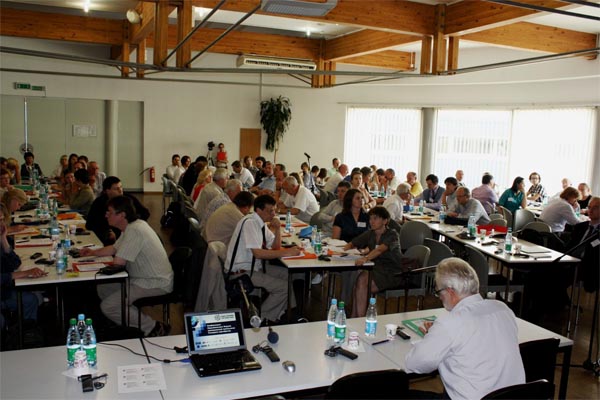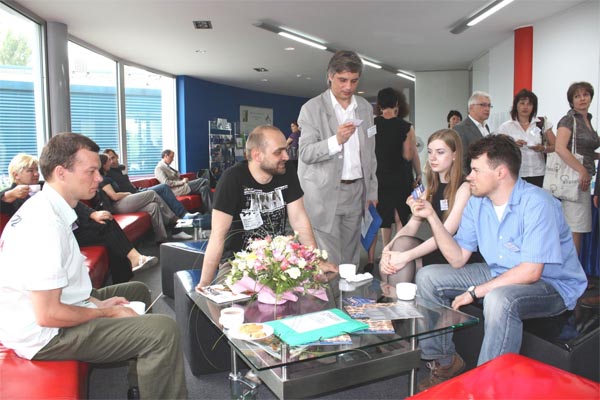Civil society
 The International Consortium "EuroBelarus" considers CIVIL SOCIETY as:
The International Consortium "EuroBelarus" considers CIVIL SOCIETY as:
1. The space for its self-determination.
2. The object of its activity, attention and concern.
We consider civil society as being the scope of manifestation of free activity of citizens, acting either alone or uniting into associations and organizations in order to express and defend their civic position with regard to urgent challenges of the country and its future.
Civil society is a sector that is free of direct intervention of the government and business, its agents act on the basis of their own goals and interests. We attribute to civil society not only traditional non-governmental organizations (NGOs), but also associations of employers, associations of employees (trade unions), religious, local, professional societies, and any declared public initiatives and movements, including informal activity of individuals and their groups.
The International Consortium "EuroBelarus" defines itself and acts in the civil society space in Belarus and in Europe.
We understand that today’s civil society in Belarus is still at a stage of development. It is small as for the number of people and organizations willing to express their civic position and to influence t actively he rate and direction of society development. Civil society actors still don’t rate high as for the role in today's Belarus. For 20 years of independent Belarus’ contemporary history civil society has not actually had favorable environment that would contribute to its formation and development.
Nowadays it is reflected in a number of difficulties and challenges*:
-
Maintaining of the Soviet practice of simulation the forms of civic engagement, which is manifested in existence and even strengthening the phenomenon of state non-governmental organizations;
-
Promiscuity (due to the nature of the political situation) of opposition political structures and civil society organizations and, accordingly, absence of a clear definition of civil society responsibilities and established relationship between it and political structures;
-
Civil society structures become professional organizations and pass from civic engagement to acting in narrow fields of its activities;
-
Marginalization of self-organized associations and structures that have their own goals, as well as individual citizens; their existence in the mode of self-preservation and survival in conditions of rejection of broad public impact.
Being aware of these problems, we see Belarusan civil society not only as a sphere of our existence, self-determination and expression of our civic position, but also as an object of our activity and concern. Development and institutional strengthening of civil society in Belarus is the goal of activity of the International Consortium "EuroBelarus" at the present stage of development of our country.
This goal determines the main directions for the development of civil society:
1. Consolidation of civil society actors as to create a joint position in relations with institutional partners.
 Belarusian civil society should be able to form and present its "voice and position, to interact on equal terms with political actors (with the government through negotiations, with the political opposition in the mode of coordination and activities’ coordination); to provide valuable influence on the changes and development of the country, its movement towards de-Sovietization, Belarusization and Europeanization. Consolidation of the civil society provides formation and strengthening mechanisms for coordination and presentation of a joint civil society position on the most important issues, mechanisms of representation of civil society of Belarus during negotiations with all stakeholders, mechanisms of civil society joint actions’ organization.
Belarusian civil society should be able to form and present its "voice and position, to interact on equal terms with political actors (with the government through negotiations, with the political opposition in the mode of coordination and activities’ coordination); to provide valuable influence on the changes and development of the country, its movement towards de-Sovietization, Belarusization and Europeanization. Consolidation of the civil society provides formation and strengthening mechanisms for coordination and presentation of a joint civil society position on the most important issues, mechanisms of representation of civil society of Belarus during negotiations with all stakeholders, mechanisms of civil society joint actions’ organization.
Within this framework "EuroBelarus" also sees emergence and development of the National Platform of the Eastern Partnership Civil Society Forum. We are moving from the use of conditions and opportunities of the EU Eastern Partnership initiative, where the National Platform has become the site for presentation of civil society voice in Belarus-EU relations, to enhancing the Belarusan National Platform Civil Society as a space and mechanism for consolidation of society on the most urgent challenges and problems of the country’s development.
2. Development of Belarusan civil society as a part of European civil society.
In this track we focus on:
-
cooperation in promoting the principles of the European Charter of Active Citizenship — active engagement of civil society as a full subject in formation the European agenda and addressing the social, political and cultural issues, which we consider common European problems;
-
development and expansion of Belarusian civil society competencies required for full inclusion in programs, projects and actions at European level;
-
development and promotion in Belarus of European standards in various areas of life and activity;
-
full integration of Belarusian civil society in discussing, critique and development of European norms and standards in appropriate institutional forms.
____________________________________
Uladzimir Matskevich. Sketches to the analysis of the third sector (2000).
Uladzimir Matskevich. On the role of personality in the NGO activity (2007).






















